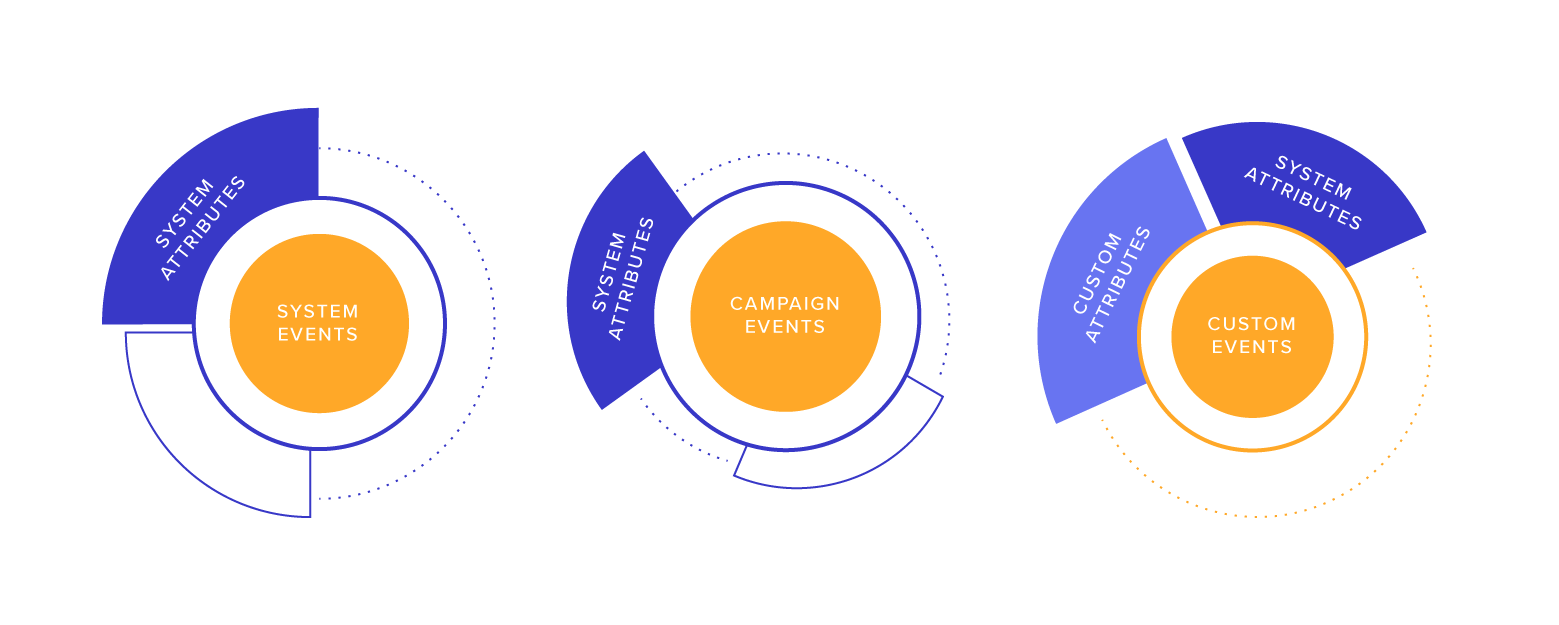What are events and their attributes?
Meaning
Savvy marketers and data enthusiasts use intelligent touchpoints to understand user actions to personalize their marketing. These intelligent touchpoints are called events & attributes. ‘Event’ refers to any action taken by a user while interacting with your mobile app, website, and campaign.
Let’s take the idea of an E-commerce platform selling phones.
If a user clicks on a product to view its details, then it is advisable to track this action as an event (Product Viewed) as it brings them a step closer to making a purchase. In this sense, tracking events is like following the user’s footprints; when arranged chronologically, they reveal a story of human behavior.
‘Event Attribute’ refers to all the details tagged to an event that helps us understand its context. If an event is a person, then an attribute is their character. Attributes lend depth and detail to events.
Say a user views some products before making a purchase. To assist with the purchase, you send each user an email with details of the product and a one-time discount offer. But merely knowing that a user viewed a product on your mobile app/website is not enough. To create a contextual and personalized email, you will need more details about the event, Product Viewed. This is where event attributes come in. Other event attributes, in this case, might include
- Product Details (Brand, battery, OS)
- Product Name (Make and model)
- Product ID (unique identifier)
Events can be further divided into
- System events
- Campaign events
- Custom events
System Events
System Events are a comprehensive predefined list of all the generic events performed by users. These events are called system events and include actions like;
- App Installed
- App Uninstalled
Campaign Events
There is also a set of generic events that users perform when interacting with your campaigns. So all interactions like:
- Email Opened
- Web Push Subscribed
are called campaign events. These events are tracked for all channels, including push notifications, in-app notifications, SMS, on-site pop-ups & banners, web push, email, Facebook, Google, and WhatsApp. Since users perform different actions when interacting with each channel, the campaign events and their attributes (also called system attributes) vary accordingly.
Custom Events
Events that are explicitly defined are called custom events.
If
search for a product was the user’s action
Then
search would be the custom event.
Similarly,
If
view product details was the user action
Then
Product – Page Viewed would be the custom event.
System Attributes
Much like system events, there is also a comprehensive predefined list of generic attributes which can give all the events performed by your users, more context. Going back to the smartphone example, system attributes might include details like;
- Time (What time was the phone bought?)
- Location (Where was the user when they bought the phone?)
Custom Attributes
Custom-defined attributes which lend more context to custom events are called custom attributes. They provide more insights into the user’s behavior. If we were to define custom attributes for the event Checkout Complete, then it would include details like;
- Cart ID
- Cart Size
Why are events and attributes important to me?
Every online marketer strives to create an ideal customer experience for the users, so they keep engaging the brand time and again. These users are varied and so are their needs and expectations. They act and react differently to the market, so it is your job, as a marketer to ensure they act and react the way you want them to.
The way to do that is through hyper-personalized contextual messaging. Simply put, every customer has tastes and preferences so the idea is to give them what they want when they want it.
But if you are a big brand with millions of users, how do you manage everyone’s expectations? By understanding a user’s lifecycle and studying their behavior to predict their needs with the help of events and attributes.
How do events and attributes help?

System attributes are generic and can be used with system events, campaign events, and custom events.
Custom attributes are tied to a specific custom event and cannot be used for other custom events.
There are two ways to calculate the number of times users perform an event.
Occurrences
These refer to the total number of times an event has been performed within a specific time frame. If a user performs an event five times within a given time frame, then occurrences will equal five, even though just one user has performed it. So, by viewing the occurrences of an event, you can get a clear picture of the total number of times the event has been performed.
Uniques
These refer to the total number of users who have performed an event, within a specific time frame. If you are viewing uniques for an event that was performed five times by a user, then uniques will equal one. So, by observing the uniques of an event, you can find out exactly how many users were responsible for its occurrence.
In this sense, Occurrences / Uniques = Average number of times an event is performed.
If you are curious to see events and attributes in action to find out how they boost conversions and improve engagement, take a look at this case study on Wego, a leading travel brand.
Conclusion
Simply put, we use events and attributes harmoniously to build a unified customer profile and refine them for more accurate results. Smartly using Events & Attributes for your omnichannel strategy enables you to craft personalized one-on-one messages easily and instantly. The sky’s the limit.




